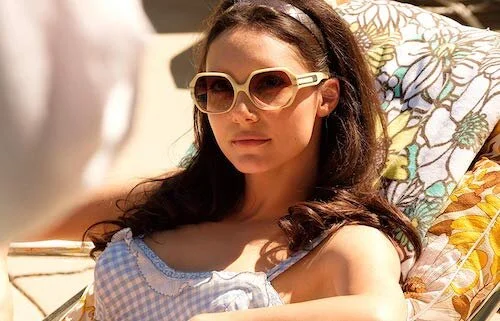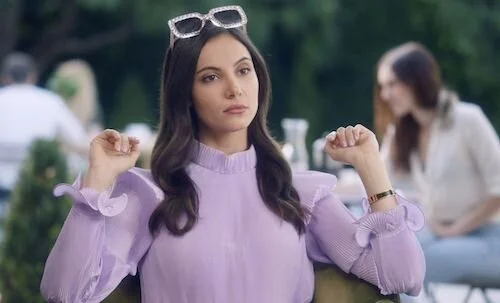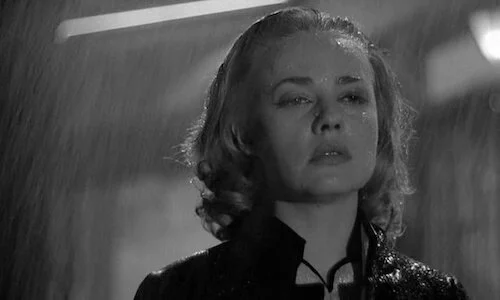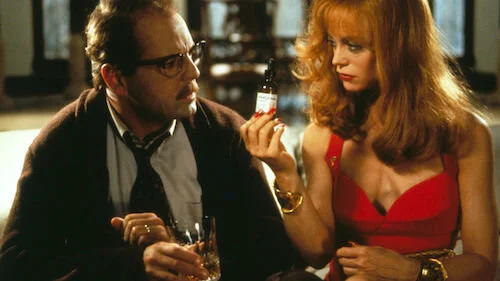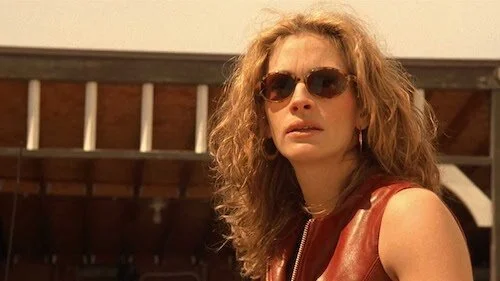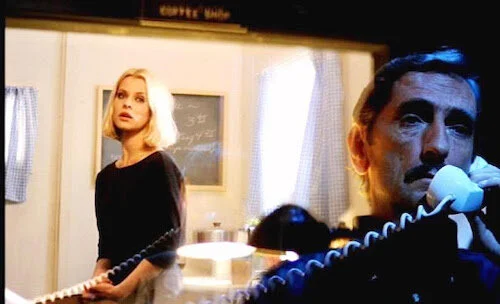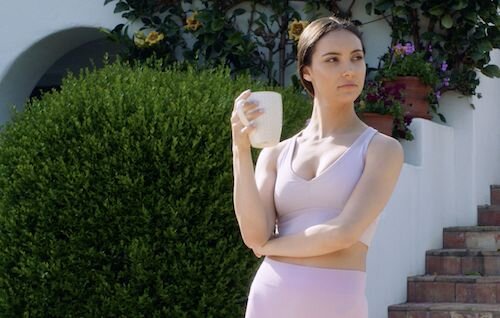Samantha Robinson: The Perfect Roles in an Imperfect World
If there was ever a rising star that has already done it all, then that would be Samantha Robinson. She has already dominated the cult cinema scene (Anna Biller’s The Love Witch), the indie circuit (Blumhouse Production’s Cam), and even a Best Picture nominee by Quentin Tarantino (Once Upon a Time in Hollywood). She also has a number of works on the horizon, including Take Me to Tarzana and Topology of Sirens. For now, she stars in Poppy Gordon’s upcoming short film For Your Consideration, which you may remember us spotlighting a few days ago. If not, here is our reminder. It premieres at Cinequest Film Festival today. For Your Consideration is a satirical take on the filmmaking process when it comes to making Oscar worthy films attached to political movements and discussions. We loved it, and wouldn’t hesitate at the opportunity of celebrating it again.
When we talked to filmmaker Poppy Gordon, we dove deeply into the commentary the short contained. Today, we have that same opportunity with star Samantha Robinson, as well as the chance to look at her filmography as a whole. Robinson kindly spent some time with us discussing her role in the project, and why this short film is necessary in 2020 (also how the shoot was a blast to be a part of). We also got down to the best discussion of all: our favourite films and filmmakers.
Be sure to check out For Your Consideration’s official website here. Samantha Robinson’s filmography can be found on her IMDb page, and you can follow her on Instagram here.
Films Fatale: How do you go about choosing a role? Your past work (The Love Witch, Cam, Once Upon a Time in Hollywood) all have poignant things to say, simply based on just the characters themselves. What is your criteria for accepting or auditioning for a role?
Samantha Robinson: I actually don’t have a lot of criteria for accepting a role. I’m always very eager to work. But, there are certain things I will look out for. The main thing is the script, and if it’s well written. Usually if a script is well written, then the characters are interesting. That’s the main thing. But I am open to playing all types of roles. It can be a role that is completely different to myself. I recently played a cat, which was completely absurd! I really got to step out of myself. That was a lot of fun. Or, I’ll accept a role (or audition for a role) that is really similar to myself. That’s fun, because you can immediately relate. For Gibby [Abigail] Folger in Once Upon a Time in Hollywood, from the research that I did, I felt like I really related to her. Some roles, you just feel you are meant to play.
FF: You bring up Abigail Folger in Once Upon a Time in Hollywood, who is very important for the Sharon Tate story. There’s also your role as Elaine in The Love Witch, which is [a film that is] similarly a ‘60s experience. It’s fascinating with what it’s saying about ‘60s cinema, feminist filmmaking (from the ‘60s and now). You say it’s about good screenwriting, but I also think you have a good eye at what good screenwriting is. So far, all of your characters have had something to say, or have been interesting characters in and of themselves.
SR: I got lucky, I think! But thank you. I appreciate you saying that. I do have a certain taste, I guess, that I do gravitate more towards. But, I’m really open to just acting in general. I love it so much. The opportunities where you get to act — at least for me— have been quite limited. When I do get a chance to act, I am very grateful for it. But, I have turned a few roles down. Unfortunately, you can’t do everything. There are some things where I’m like “Nah. This is not for me.”
FF: If [the role’s] not right, it’s not right. Right?
SR: Exactly!
The Love Witch.
FF: Your work carries strong commentary on female representation in cinema. Example: The Love Witch is a potent work of feminist filmmaking, and a commentary on cinema in general (especially the ‘60s). Are female filmmakers, like Poppy Gordon, getting the dues they deserve in 2020? What work can be done to improve the current situation?
SR: Well, I think the situation is improving a lot. The fact that filmmakers like Poppy can get their films financed, produced, distributed and seen is a huge step forward. But, I know it’s not always that simple. I know that it can be quite difficult to get them financed, and that it’s very frustrating. I do think things are looking up. I know that a lot of studio backed films for 2020 actually have a lot more women slated to direct, which is fantastic! I think that the female point-of-view is becoming more and more valuable. But are they getting the recognition they deserve? I do think we have a long way to go with that. I think it’s growing, for sure. But, I do think we have a long way to go.
FF: I think a lot of that has to do with the industry itself, especially with awards season (and the like) favouring the ways of the old, as opposed to this growing impact we have now. [At these events] female or persons-of-colour as filmmakers are still kind of treated as rare occasions, when there are so many voices waiting to be heard. These filmmakers are still treated as niches, but their amounts are actually plentiful when given the opportunities to be heard.
SR: I completely agree with you.
FF: What drew you to Poppy Gordon’s For Your Consideration? Was it the role itself, or the entire short? Both?
SR: It was both. I found the short to be very amusing when I read it. I thought it was the perfect send up of these characters who are trying to make a project that’s trying to fit into a politically correct slot. Not because they have these sincere, or heartfelt, intentions behind it, but because they want fame, money, success and the social media likes. I thought it was written in a very clever way.
The character I play, Heather… she is completely shallow, uninformed and privileged. I have to say it was very fun to play her! I didn’t expect to have that much fun. When I was on set, I turned to some of the other girls and said “Oh my goodness! I’m having a blast playing this role.” I don’t know what that says about me! But the whole experience was great. There were so many females on set, from the costume designer, to the production designer, producer, obviously Poppy, and all the other girls I was acting with. It was a girl gang. Aldo [Arias] was there, of course, too. It was a really fun experience overall. [writer’s note: Aldo Arias helped work on For Your Consideration]
Once Upon a Time in Hollywood.
FF: It certainly seemed that way. Even though it’s a satirical take on a serious topic, it seems like such a bubbly environment. You can just tell when a film set is painful to be on, or when it’s very nice to be on. Watching For Your Consideration… It’s not just the colours or the wardrobe. The people there, despite the commentary, look like they’re having a blast. You’re absolutely right.
SR: Yeah! We were. We were having a lot of fun. And the commentary is told through a comedy lens so I think it is easier to digest.
FF: Is it difficult to perform in a satirical short of this nature? As in, being able to portray characteristics, ideas and mannerisms in such a short amount of time?
SR: No. For me, not at all. I think it doesn’t really matter how much time you have. I could have had thirty seconds playing this character, or an hour. The character is created beforehand. I think what would make a difference if the short reads or not, is how it’s directed, and how it’s written. That’s more on Poppy and Aldo, I think. For me, the time frame makes no difference at all. I still come on set with a specific point of view.
FF: Did you have any form of creative freedom with what you wanted to bring to the character? Perhaps, inflictions on what’s being said?
SR: Yeah! Poppy actually had a different idea for the role. She wanted more of an “Aubrey Plaza” type. Then she ended up liking the way I interpreted the character, and decided to go with me. She gave us a lot of freedom. We actually had one take where we each did an improv. We could completely change the lines in any way. I know she actually used some of the lines from the improv in the short.
[Writer’s note: the discussing of which lines were improvised was cut from this transcript, as to not spoil the short For Your Consideration ahead of its release in festivals and to the public]
FF: A lot of [the improvising] was in perfect harmony with the rest of the comedic writing. I guess everybody firmly understood what they signed up for, and they executed it well!
SR: Yep!
For Your Consideration.
FF: How do you feel about the overall awards season race, in conjunction to what the short film is saying?
SR: I think the short really does bring up some valid points. It’s quite bold in making them, which I think other people might be a little bit more scared to make. It does have a provocative message about the awards seasons race, but because it’s done in a parodic way, I think it still makes it funny and easy to digest. I definitely think it’s shedding a light on what an award is worth, what people will do to get one, and how it’s decided.
FF: Even though it’s a comedic short, it’s not necessarily far off from the truth. Whether a film is being made for that reason, or even if it’s not but is promoted for that reason. That’s definitely a real thing.
SR: Yes, you can always see the projects where that’s happening. It’s very obvious. It’s kind of cool that this short is shedding a light on that. It’s being real.
FF: What advantages does comedy have in spreading an important message, especially in a time where we could all use a good laugh?
SR: I think that [comedy is] an amazing tool to get your message across, because people’s guards are down. Comedy is light hearted, so it’s nonthreatening. Even if you don’t have a message, having a good laugh is great, especially in today’s age. Everyone just needs to have a good laugh.
FF: Absolutely. Everything is too dismal right now. It seems silly to say that we could all use a laugh when everything seems so dire, but it makes everything seem a little bit easier.
SR: When you’re going through a really difficult time that’s when, more than ever, you need some comic relief, because we can’t just exist in that dark state all the time. It’s not healthy.
FF: To bring it back full circle, all of the performances of yours (that I have personally seen so far)… The Love Witch, even a role like the one in Cam… your performances seem to have this little ray of light, whether you’re the protagonist or not — I’d argue in Cam you’re somewhat of an antagonist, a little bit — you still have this playfulness, and optimism in all of these roles that you play.
SR: Thank you! I appreciate that. I don’t always play the nicest characters but I’m having fun playing them, and maybe that’s what’s coming across.
FF: We like to send interviews off with the most basic question, based on why we are all cinephiles. What are your top five films of all time, and why?
SR: It is so difficult to choose five.
Elevator to the Gallows
Elevator to the Gallows is one of my favourite films. Jeanne Moreau. The Louis Malle film. I’ve always loved it.
Death Becomes Her
Another one of my favourites is Death Becomes Her. I always get a kick out of that one.
Erin Brockovich
Another one I can just watch over and over again. It gets me every single time.
All About my Mother
Pretty much any [Pedro] Almodóvar film. I love him. I would say one of my tops is All About my Mother. It’s just so good. I truly love all of his films.
Paris, Texas
Paris, Texas as well is another one of my favourite films.
FF: I also love Wenders, Almodóvar, Elevator to the Gallows. It’s like you’re taking my picks!
SR: Thank you! I’m glad we have the same taste in films.
FF: And Paris, Texas, especially the phone scene.
SR: Yes! With Nastassja Kinski! It’s amazing. It just shows how you can convey so much emotion with no words whatsoever. [Harry Dean Stanton] is just talking to her, and you just see her face. It’s powerful.
FF: [On the topic of Pedro Almodóvar] Did you see Pain and Glory?
SR: I haven’t seen it yet! I hear it’s fantastic. Do you love it?
FF: Yeah! As a big fan of his… have you seen 8 1/2 by [Federico] Fellini?
SR: Yes. I have.
FF: This is basically Pedro’s 8 1/2. I can’t recommend it enough. It’s fantastic.
SR: Wow! I’ve heard great things. I just haven’t seen it yet. What other films did you like from last year? Did you see Uncut Gems?
FF: Absolutely! Did you get around to that one?
SR: I loved it. I love the Safdie brothers. I’m a huge fan of them. I love this one. I think this one’s my favourite of theirs.
FF: Agreed. And Good Time was already fantastic. How can it get more intense? And then Uncut Gems happens. It felt like my heart was going to stop beating, it was beating so fast!
SR: I know! I don’t know how they do it. From the first shot, you’re like (makes gasping noise)!
FF: I’m not a big Adam Sandler fan, but he killed it. So good.
SR: I’m a huge fan of his. I thought he was incredible. I honestly was blown away by his performance. Have you seen Heaven Knows What by [the Safdie brothers]?
For Your Consideration.
FF: I haven’t.
SR: That was another really intense one!
FF: I need to get around to their older stuff. I’ve unfortunately only seen the two [newer films], and I know not everything they do is people running around town doing stuff. I need to get more familiar with the older stuff. I know Good Time was basically made for Uncut Gems to get made.
SR: What?
FF: I believe so. They wanted to make Uncut Gems for around ten years or so. Robert Pattinson was like “Hey, let’s make a movie!” [writer’s note: Pattinson saw the poster for Heaven Knows What and wanted to work with the Safdie brothers]. It was basically Uncut Gems light, so they could possibly get the project off the ground.
SR: Wow. That’s crazy! Well, good for them then!
FF: They pulled it off! Other films I really liked… Not a bias thing, but [Once Upon a Time in] Hollywood is one of my favourite Tarantino films.
SR: Isn’t it great?
FF: I’m super obsessed with ‘60s culture. Parasite I loved as well.
SR: Parasite was great! I loved that too.
FF: That was my favourite of last year. I didn’t think [the Academy] would actually give a foreign film Best Picture, so I was rooting for Once Upon a Time in Hollywood to win. But Parasite actually won! There you go.
SR: I know! And he was very humble and nice in his acceptance speech, Bong Joon-ho. I thought it was fantastic. There were a lot of great films last year, I have to say!
FF: It was a really good year! Still The Lighthouse, Little Women, Marriage Story, The Last Black Man in San Francisco…
SR: Yep! I hear [The Last Black Man in San Francisco] is amazing. I haven’t seen that one, but I hear that one is incredible.
FF: What were some of your favourites from last year?
SR: I really liked Marriage Story. Parasite, of course. Uncut Gems was one of my favourites. Midsommar I really liked. The Farewell was great. I thought that was really touching. So many films! It was a good year.
We thank Samantha Robinson for talking acting, films, and For Your Consideration with us. The official site for For Your Consideration can be found here. Also make sure to visit Samantha Robinson’s official Instagram account, and her IMDb page.
Andreas Babiolakis has a Masters degree in Film and Photography Preservation and Collections management from Ryerson University, as well as a Bachelors degree in Cinema Studies from York University. His favourite times of year are the Criterion Collection flash sales and the annual Toronto International Film Festival.



